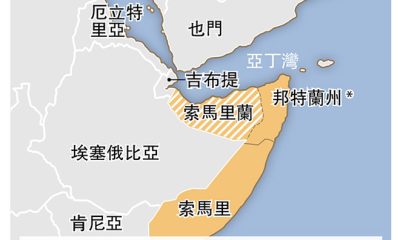觀點
Emil Avdaliani:Russia’s Return to the Middle East

【明報文章】Despite losses in Syria, Russia is increasingly welcomed across the Middle East.
Since the fall of the Assad dynasty in Syria in late 2024 and the relative weakening of Iran before and during the brief war with Israel, Russia’s position in the Middle East seemed to have been significantly degraded.
Yet, recent months proved the Russian influence in the Middle East is more enduring. In April Russia and Oman signed an agreement to establish a visa-free regime. The visit was notable as the meeting held between Russian President Vladimir Putin and the Sultan of Oman, Haitham bin Tariq Al Said was the first one between heads of states in the history of bilateral relations.
Likewise in April the Qatari Emir Sheikh Tamim bin Hamad Al Thani paid a visit to Moscow where he met with Russian President Vladimir Putin to discuss bilateral economic relations and regional geopolitical developments. Similarly, in early August the United Arab Emirates President Mohammed bin Zayed al Nahyan paid a visit to Moscow to discuss trade, investments and regional developments with his Russian colleague.
The members of the Gulf Cooperation Council (GCC) have their own reasons to develop tighter relations with Russia. The war in Ukraine is seen by the GCC as a distant conflict and the country chooses to tread a middle path not to alienate either side. With that in mind, the GCC sees how Russia turns to the Global South. Relatedly, the reorientation of Russia’s economy provides opportunities for the wealthy Arab countries which are actively pushing for more diversified economic relations within the respective frameworks of the building a post-oil economy. The latter requires new partners and investments from big actors with experience. Russia is seen as one of such powers. For instance, the GCC countries eye Russia’s experience in agriculture, transport development etc.
Even in Syria, Moscow managed to regain momentum. Russian media reported that Damascus expressed interest in the Russian military police resuming patrols of Syria’s southern provinces. The Arab media also reported that Russia has simultaneously resumed patrols near the northeastern city of Al-Qamishli, Arab media claimed. These steps follow the Syrian FM, Asaad al-Shibani’s visit to Moscow and are related to Damascus’ efforts to limit the military activity of Israel. Overall, this paves the way for Russia to retain its military presence in two military bases in Syria and, therefore, for Russia to retain its power in the Eastern Mediterranean.
Continuity in cooperation with Iran is yet another aspect of Russia’s unceasing engagement with the Middle East. Though, the Iranian leadership was unhappy with Moscow’s distancing during Israel’s recent war on the Islamic Republic, the two remain firmly committed to further expansion of bilateral ties and especially in the military realm. One of the core aspects which serves as a glue for Tehran and Moscow is their anti-Westernism and the pursuit of multi-polar world order much evident in through the bilateral comprehensive treaty inked earlier this year. Yet, on a more practical level, the International North-South Transport Corridor (INSTC) – massive route linking Russian cities with the Iranian ports and further down with the India Ocean – is far more consequential geopolitically.
Despite the instability in the Middle East following Iran’s short war with Israel, the work on the INSTC continues. Russia reached several corridor-related accords in early 2025 among which stands out the Russia–Iran Roadmap 2025. The latter document involves commitments from Tehran and Moscow on completing the still unfinished Rasht-Astara railway. Recent statistics indicate that trade along the INSTC is expanding. In 2024 Russian authorities reported a 19% increase in total cargo via the corridor, equaling some 26.9 million tons.
Russia has also upped its engagement with the Middle Eastern countries in such areas as civilian nuclear cooperation. The Iraqi Atomic Energy Commission is close to signing a draft cooperation agreement with Russia on the development of peaceful use of nuclear energy, which involves the establishment of nuclear reactors for power generation. This latest announcement comes after four memorandums signed earlier between the two countries and touching upon energy cooperation.
Beyond bilateral engagement Russia’s approach has also involved a more regional perspective which was lacking in previous periods. Earlier this year the Russian leadership announced all leaders and the secretary general of the Arab League would be invited for the first Russia-Arab summit in October. Russia does not offer a framework for solving the Middle East’s enduring conflicts or economic troubles that beset the region. Moscow’s foreign policy remains nimble and free of ethical aspects which often burdened the Western policies.
For Russia the Middle East remains central in its efforts to recalibrate its foreign policy as well as commercial ties which since 1990s were mostly focused on the EU and the West overall. Yet, Russia does not aspire nor does it have enough resources to become a central power in the Middle East. Moscow is using the sentiment which is increasingly prevalent among the Middle East countries: pursuit of more balanced foreign policy. As the age of exclusive American influence in the region has come to an end, this opened up a whole vista of opportunities for Moscow. From Turkey to the Gulf countries to Iraq and even Israel, all seek Russian engagement in one form or another. In the age of multipolarity, Moscow is regarded by the Middle Eastern powers as an effective balancer against other big powers.
Emil Avdaliani is a professor of international relations at the European University in Tbilisi, Georgia, and a scholar of Silk Roads. He can be reached on Twitter/X at @emilavdaliani.
[Emil Avdaliani]
日報新聞-相關報道:
Emil Avdaliani:中東國家尋求平衡外交 俄羅斯被視有效平衡器 (2025-09-22)





